Daily Vocabulary Words: List of Daily Used Words in Leading International Newspapers
Hi there. Welcome to this special section @ Wordpandit.
Our endeavour here is very simple: to highlight important daily vocabulary words, which you would come across in leading newspapers in the country. We have included the following newspapers in our selection:
• The New York Times
• The Washington Post
• Scientific American
• BBC
• The Guardian
• Psychology Today
• Wall Street Journal
• The Economist
We are putting in extensive work for developing your vocabulary. All you have got to do is be regular with this section and check out this post on a daily basis. This is your repository of words that are commonly used and essentially, we are posting a list of daily used words. Hence, this has significant practical application as it teaches you words that are used commonly in leading publications mentioned above.
Visit the website daily to learn words from leading international newspapers.
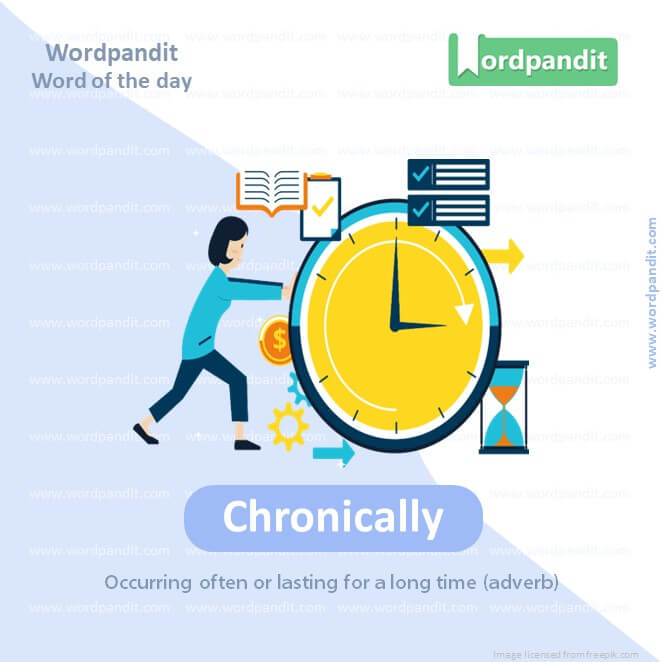
WORD-1: Chronically
CONTEXT: What matters is compensation for the thousands of chronically ill people and their families for half a century of pain and in some cases.
SOURCE: Washington Post
EXPLANATORY PARAGRAPH: You know how some people always seem to be late? Well, if someone is late all the time, it’s like they are “chronically” late. It means something happens a lot or all the time.
MEANING: Occurring often or lasting for a long time. (adverb)
PRONUNCIATION: Kroniklee
SYNONYMS: Persistently, constantly, continuously, habitually, regularly, recurrently, perpetually
USAGE EXAMPLES:
1. He is chronically late to meetings.
2. She suffers from chronically dry skin.
3. The team has been chronically underperforming.
4. The plant is chronically in need of water.
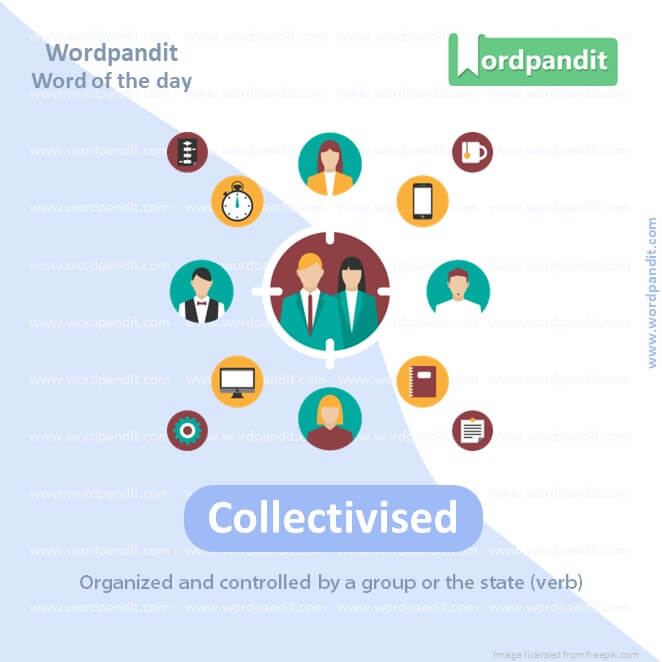
WORD-2: Collectivised
CONTEXT: The government machine draws its wagons into a circle and does everything to defend its reputation, past as well as present, and not distress the Treasury. Blame collectivised is blame denied.
SOURCE: The Guardian
EXPLANATORY PARAGRAPH: Imagine if all the toys in the neighborhood were put together in one big toy box, and everyone shared them. “Collectivised” means making things or places owned and used by a group rather than just one person.
MEANING: Organized and controlled by a group or the state. (verb)
PRONUNCIATION: Kolektivized
SYNONYMS: Unified, centralized, socialized, grouped, consolidated, pooled, merged
USAGE EXAMPLES:
1. The farms were collectivised under the new policy.
2. The community collectivised their resources for the project.
3. After the revolution, industries were collectivised.
4. The people collectivised their efforts to clean up the park.
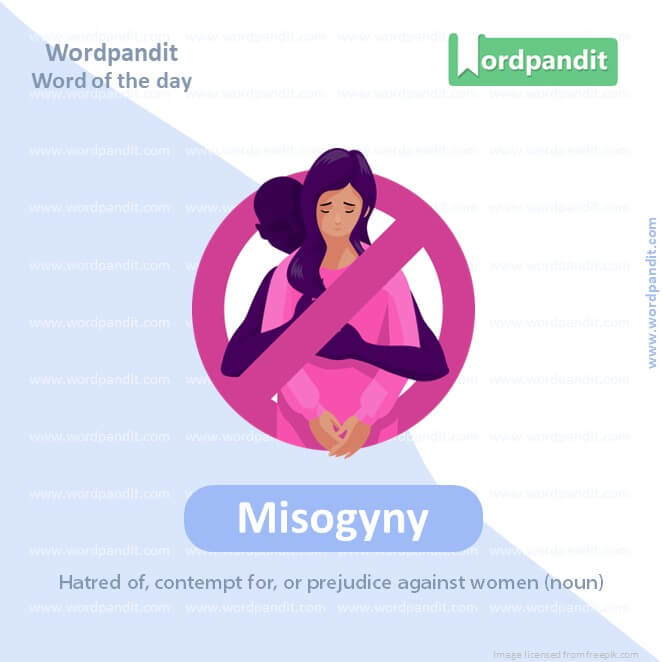
WORD-3: Misogyny
CONTEXT: We have problems of discrimination, misogyny, sexual violence, domestic violence.
SOURCE: New York Times
EXPLANATORY PARAGRAPH: “Misogyny” is a big word that means not liking or being mean to girls and women just because they are girls or women. It’s not a nice feeling, and it’s important to treat everyone with kindness.
MEANING: Hatred of, contempt for, or prejudice against women. (noun)
PRONUNCIATION: Misojuhnee
SYNONYMS: Sexism, womanhating, chauvinism, prejudice, discrimination, bigotry, bias
USAGE EXAMPLES:
1. We must challenge misogyny wherever we see it.
2. The movie was criticized for its blatant misogyny.
3. Some ancient texts contain elements of misogyny.
4. Educating the masses is one way to combat misogyny.
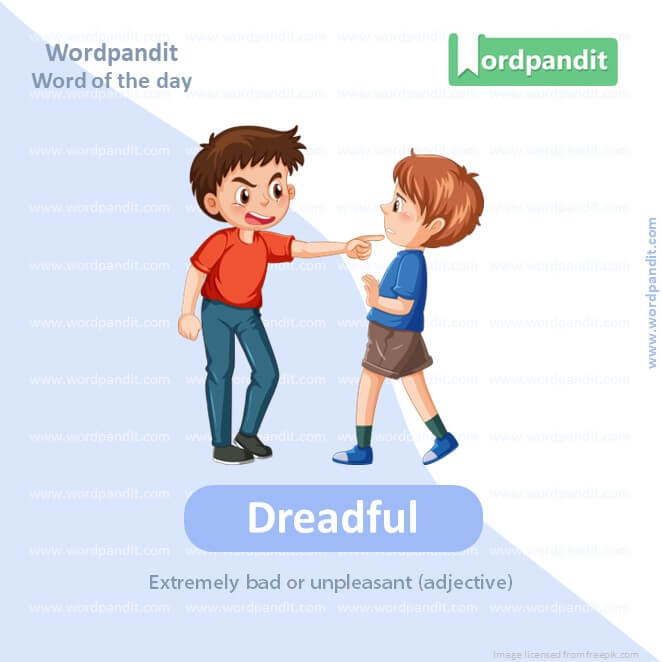
WORD-4: Dreadful
CONTEXT: This sense of national failure? Why our dreadful public services, polluted waterways, declining health outcomes and the self-harm of Brexit?
SOURCE: The Guardian
EXPLANATORY PARAGRAPH: Imagine you tried a new food and it tasted really, really bad. You could say it was “dreadful”! It means something is very bad or not nice at all.
MEANING: Extremely bad or unpleasant. (adjective)
PRONUNCIATION: Dredful
SYNONYMS: Terrible, awful, horrible, ghastly, frightful, atrocious, lousy
USAGE EXAMPLES:
1. The weather outside is dreadful.
2. She had a dreadful experience at the hotel.
3. His manners were simply dreadful.
4. The cake tasted dreadful.
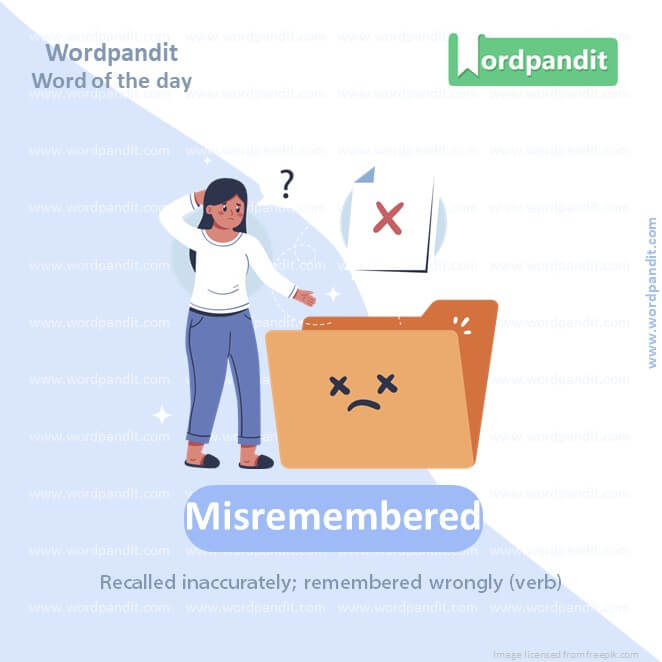
WORD-5: Misremembered
CONTEXT: The supposed glories of a misremembered past used as a distraction from an uncertain future.
SOURCE: The Guardian
EXPLANATORY PARAGRAPH: You know when you think you remember something, but then you realize you got some details wrong? That’s called “misremembering.” It’s like when you thought your toy was in the toy box, but it was actually under the bed!
MEANING: Recalled inaccurately; remembered wrongly. (verb)
PRONUNCIATION: Misremembered
SYNONYMS: Misrecalled, forgot, confused, mistook, muddled, blurred, misconstrued
USAGE EXAMPLES:
1. I must have misremembered the date of the event.
2. He misremembered the lyrics of the song.
3. She apologized for misremembering the instructions.
4. They misremembered the location of the meeting.
WORD-6: Exceptionalism
CONTEXT: Allowing people you wouldn’t trust with your wallet or to babysit your children to rise through deceit and thrive through failure. We boast of “British exceptionalism.
SOURCE: Washington Post
EXPLANATORY PARAGRAPH: Imagine if one person believed they were super special and different from everyone else in a big way. “Exceptionalism” is the idea that someone or something (like a country) is very special and different from others.
MEANING: The belief that something, especially a nation, is unique or superior compared to others. (noun)
PRONUNCIATION: Exsepshuhnalizm
SYNONYMS: Superiority, uniqueness, distinctiveness, specialness, primacy, elitism, exclusivity
USAGE EXAMPLES:
1. Some believe in American exceptionalism.
2. The idea of exceptionalism can lead to misunderstandings between nations.
3. Cultural exceptionalism often affects international relations.
4. He often displayed an attitude of personal exceptionalism.
WORD-7: Calibrated
CONTEXT: American Armalite rifles fire ammunition calibrated in millimeters.
SOURCE: Al Jazeera
EXPLANATORY PARAGRAPH: Imagine having a toy that needs to be set just right to work perfectly. “Calibrated” means adjusting or setting something so it works the way it’s supposed to.
MEANING: Adjusted or set to ensure accurate performance or measurement. (verb)
PRONUNCIATION: Kalibrayted
SYNONYMS: Adjusted, tuned, set, aligned, regulated, measured, standardized
USAGE EXAMPLES:
1. The instrument was calibrated for accuracy.
2. The machine needs to be calibrated regularly.
3. He calibrated the telescope to view distant stars.
4. The scales were calibrated to ensure precise measurements.
WORD-8: Obscurantism
CONTEXT: The genius of the British unwritten (more accurately, uncodified) constitution is deliberate obscurantism. Constitutional smoke.
SOURCE: Al Jazeera
EXPLANATORY PARAGRAPH: You know how sometimes, people might hide information or make it hard to understand on purpose? “Obscurantism” is like that. It’s when things are made unclear or hidden from people.
MEANING: Deliberate prevention of the facts or the full details of some matter from becoming known. (noun)
PRONUNCIATION: Obskurantizm
SYNONYMS: Secrecy, ambiguity, vagueness, confusion, mystification, evasiveness, cloudiness
USAGE EXAMPLES:
1. The government was accused of obscurantism on the issue.
2. The author’s writings were full of obscurantism.
3. Many felt that the committee’s decisions were shrouded in obscurantism.
4. Critics argue that obscurantism prevents public understanding.
WORD-9: Commendable
CONTEXT: The fact that Meloni made any address at all is, arguably, commendable.
SOURCE: New York Times
EXPLANATORY PARAGRAPH: When you do something really good and others say “Great job!”, what you did is “commendable”. It means you did something that deserves praise or approval.
MEANING: Deserving praise or approval. (adjective)
PRONUNCIATION: Kuhmenduhbul
SYNONYMS: Praiseworthy, admirable, laudable, notable, meritorious, worthy, excellent
USAGE EXAMPLES:
1. Her efforts to help the community are truly commendable.
2. The team showed a commendable performance.
3. His dedication to the cause is commendable.
4. They made a commendable effort to finish the project on time.
WORD-10: Feminine
CONTEXT: Stereotypically feminine traits such as being caring, supportive, and sensitive.
SOURCE: The Guardian
EXPLANATORY PARAGRAPH: You know how some things might remind you of girls or moms, like dresses or soft colors? “Feminine” describes things or qualities that are often associated with girls or women.
MEANING: Having qualities traditionally associated with women, especially delicacy and prettiness. (adjective)
PRONUNCIATION: Feminin
SYNONYMS: Womanly, ladylike, girlish, delicate, soft, graceful, tender
USAGE EXAMPLES:
1. She has a feminine charm about her.
2. The room had a feminine touch with soft colors and floral designs.
3. He admired the feminine grace of the dancer.
4. The perfume had a light and feminine scent.
Vocabulary new Words
In the exuberant realm of language learning, nothing holds more thrill than the discovery of ‘vocabulary new words’. These gems of knowledge bring with them a fresh perspective and a deeper understanding of language. However, learning ‘vocabulary new words’ requires a methodical and focused approach.
The act of learning ‘vocabulary new words’ is a delve into linguistic novelty, often involving exposure to unfamiliar structures and meanings. Transcending the traditional approach of mere memorization helps in truly cementing newly learnt words into long-term memory. Interaction with a broad spectrum of written and spoken material, including novels, films, podcasts, and digital resources, provides a rich context of ‘vocabulary new words’ and significantly aids in their comprehension.
It’s noteworthy that unpacking ‘vocabulary new words’ is a steady process rather than a rushed one. A planned approach with a specific number of words, learned and reviewed each day, proves beneficial in effective learning. Coupling this method with technologies such as flashcards or memory-enhancement software can optimize the retention of ‘vocabulary new words’.
Integrating mnemonic devices and visual imagery is another highly efficient tool when learning ‘vocabulary new words’. Assigning unique stories or visuals to new words can enhance recall, making unfamiliar vocabulary much more approachable.
Lastly, practicing ‘vocabulary new words’ within daily routine is crucial for grasping their usage. Whether it’s through active utilization in conversation or incorporating these words in written communicative situations, application reinforces understanding.
In summation, mastering ‘vocabulary new words’ is an enriching pursuit that expands our linguistic horizons. However, a balanced approach, combining diverse reading materials, pacing your learning, employing memory-boosting strategies, and daily practice greatly streamlines the task. Embark on this fascinating journey, and let the ‘vocabulary new words’ fill your linguistic canvas with a fresh palette of expressions.











